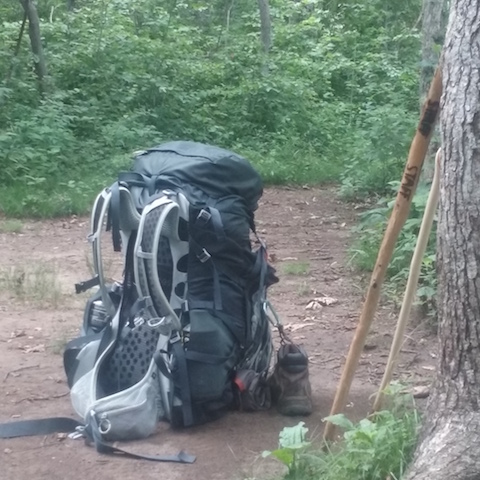AT Lesson #3: Learn to Say No


This backpack contained everything I would need for the next 7 days on the trail, including my food, shelter, and clothes. I carefully scrutinized everything that went into this pack.
In one fluid motion, I raked the spine of my knife down the length of the firesteel propelling a steady stream of sparks toward the small metal can. The denatured alcohol in my homemade SuperCat stove instantly ignited into a translucent blue flame. In less than 10 minutes I would enjoy the steaming, bold, liquid of life that some irreverently call just a cup of coffee.
I had awakened 30 minutes earlier, but had lazily remained snug in my sleeping bag, listening to the sounds of the world around me come to life. Birds greeted the morning with song, squirrels rummaged through the underbrush, and a gentle breeze stirred the canopy above me. Eventually the call of nature drowned out all other voices and I emerged from my hammock.
Placing a small titanium pot on my stove, I began heating water for breakfast. My breakfast this morning would be a couple of packets of Maple and Brown Sugar instant oatmeal with a handful of walnuts stirred in to make a complete protein. For additional carbohydrates, I added some raisins to the mix. Compact and lightweight, this breakfast was nutritious and filling. As Napolean said, an army marches on its stomach and I planned to cover some mileage this day.
The Virginians joined me at the wooden picnic table carrying several bags. The husband retrieved a white gas camping stove and assembled the components while his wife unpacked their breakfast supplies. From the food bags she pulled a box of pancake mix, some freeze dried sausage patties, a large bottle of syrup, some powdered sugar, a can a Pam cooking spray, a full-size spatula, a full-size frying pan, two bottles of apple juice, among other things.
It was no wonder why these two nearly collapsed as they came into camp the night before.
A few days later, a hiker friend told me that he had recently camped with the husband-wife team. They had made some delicious tacos using freeze-dried ground beef, a can of re-fried beans, and jar of picante sauce. They had extra so he enthusiastically accepted their offer to share.
The pair were eating very well. And truth be told, their pancakes and the thought of tacos on the trail still invokes a Pavlovian response in me. However, I can’t imagine the weight they had to carry to support such a dining experience.
AT Lesson #3: Learn to Say No
It’s easy to make a series of individual decisions in insolation, without considering the larger picture. In the case of the Virginians, each cooking utensil and food item didn’t add a lot of weight by itself. The frying pan only added 1.5 pounds, the can of Pam another 1/2 pound, the spatula, 4 ounces. However when considered in totality, the extra weight and bulk added up. And as a result their time on the trail may not have been as enjoyable as it would have been with a smaller pack.
The same thing can happen in life off the trail. Accepting just one more responsibility, agreeing to undertake just one more small project, may not seem like a big obligation when considered individually. However, when you look at the collective impact of your choices, you may be left with very little margin in your time or in your finances.
A series of decisions can distract you from your overall goal as well. When coaching others, I remind them to consider each decision carefully. Will your choice take you a step closer toward the goal you’ve identified as important to you? Will it be a step sideways, which could be ok or even fun? Or will it be a step backward and jeopordize your progress? Don’t lose sight of your goal when making decisions.
Learning to say ‘no’ to individual opportunities is tough. This is one of those lessons that I continually struggle with. I’m an optimist at heart. But I’ve learned that, in saying yes to a good thing, I may accidentally be saying no to something better.
(In fairness to the Virginians, they may have considered their culinary luxuries worth the added weight and bulk. It was their decision to make and their packs to carry, not mine. On the trail, as in life, everyone must hike their own hike.)


Recent Comments